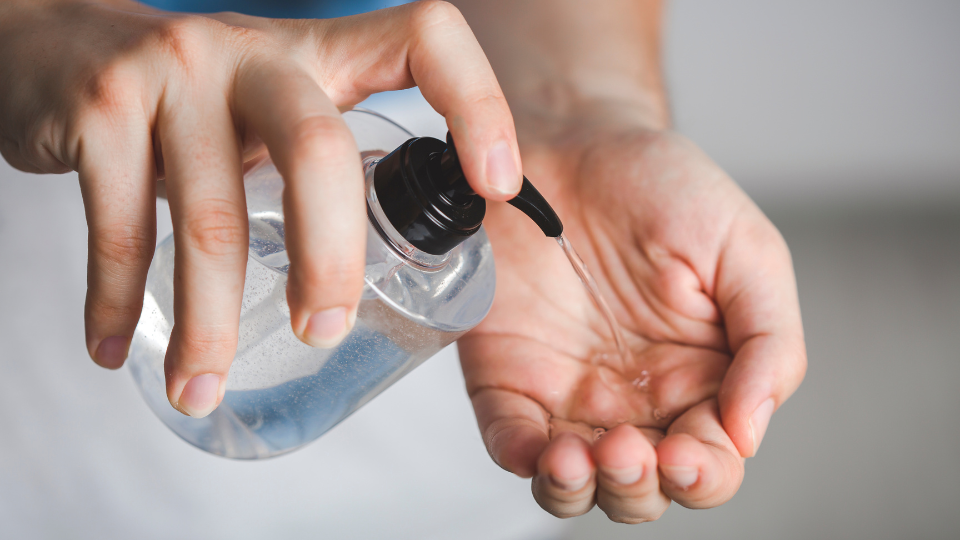Since the early days of the pandemic, alcohol-based hand sanitisers are among the most sought-after commodities in the world. The volume of these products now being commonplace in homes, schools and workplaces may be a cause for concern due to several toxic side effects.
Alcohol-based hand sanitisers come as liquids, gels or foams, and contain one of two different types of alcohol – ethanol and isopropanol. Alcohol destroys viruses (including coronavirus) and bacteria by dissolving the outer protein layer which is vital for a virus’s survival and multiplication thereby inactivating/killing the germs. Hand sanitisers also contain a moisturiser e.g. glycerol, and sterile water. Some preparations have the antiseptic hydrogen peroxide too.
In the UK, hand sanitisers should comply with the EU Biocides Regulation 528/2012, being able to prove that the product matches the claims such as if it kills 99.9% of bacteria and viruses, then it should be able to do just that.
Although rare, it is possible to have allergic reactions to sanitiser, they are flammable if exposed to flames or high temperatures, and can cause eye irritation if rubbing eyes before it has fully dried.
If swallowed, sanitisers can cause headache, blurred vision, nausea and vomiting, abdominal pain from inflammation inside the gut, increased risk of bleeding in the stomach from this inflammation, and in higher concentrations – alcohol poisoning with loss of coordination, seizures from low blood sugars, decreased consciousness, and rarely, death.
A recent BMJ article stated the following:
- In the UK there was a 157% increase in poisonings from hand sanitisers reported to the National Poisons Information Service(NPIS) between January and September 2020 (398 calls) compared to reports from the same time period in 2019 (155 calls).
- In the US, almost 33,000 hand sanitiser exposure cases were reported to the 55 US poison control centres between January and November 2020 which is an increase of 73% compared to reports from the same time period in 2019 (19,000 cases).
Thankfully most hand sanitisers don’t taste good and Purell, an American manufacturer, have purposefully added unpleasant bitter tasting ingredients to its product to make it undesirable to drink.
If medical providers are supplying alcohol-based sanitisers, it is important that the contents should be supplied in lockable automated dispensers to reduce cross contamination and improve safety.
Accidental Poisoning
The vast majority of those exposed are children under 6 who will most commonly access hand sanitiser by putting their mouths on the pump, or by licking what was pumped out on their hands by parents. Some drink it by accident after finding it in the home or in a parent’s bag. Serious toxicity would not be expected in any of these situations, but the advice is to give sweet fluids and a snack whilst calling NHS 111 for advice from the NPIS and watching out for any signs of inebriation.
Intentional Poisoning
Hand sanitisers contain stronger concentrations of alcohol that in beer, wine and most spirits. In 20162 an American banker admitted to drinking hand sanitiser at work to cope with the stress of working there. She worked her way up to drinking “at least a bottle a day”
It is less commonly seen in adults who can legally buy alcohol, unless they are in an institution like a hospital or prison where alcohol isn’t allowed; or are alcoholics who can’t obtain alcohol any other way or are trying to hide their drinking; or those with serious mental health condition who are trying to commit suicide.
Teenagers who can’t buy alcohol legally are known to occasionally abuse hand sanitiser. The numbers however are thankfully small, but perhaps most minor incidents do not get reported. And if they are not really ill, they won’t go to Hospital and where it is routinely reported.
Long before the pandemic when hand sanitisers weren’t as abundant, a paper from 20153 showed that out of 385 Texas teenagers who ingested hand sanitizer over a 13 year period, most drank it my accident with only 18% deliberately ingesting it. More than 60% were male with the average age being 15.
Alcohol content
World Health Organisation/WHO has recommended that hand sanitisers need to be at least 60% alcohol in order to kill most viruses. If less than 60% alcohol they were found to be less effective at killing bacteria and fungi and may only reduce the growth of germs rather than killing them outright.
Which? (a UK consumer testing company) announced last week4 that following testing of 18 high street and online hand sanitiser brands, 3 contained far less alcohol than claimed (around 10%) which is too little to be effective in killing germs, so they reported it with some being withdrawn from the market. Which? has reported their findings to the Health and Safety Executive and Trading Standards who are investigating this further. Thankfully the remaining 15 hand sanitisers all had the percentage levels of alcohol they claimed or higher.
Summary
Hand hygiene is the cornerstone of preventing infection and in most clinical settings, alcohol-based hand sanitisers are the preferred approach, unless hands are visibly dirty when soap and water should be used. The government and public health authorities have successfully heightened our awareness of, and need for, better hand hygiene during the covid19 outbreak, so this article should not deter from the use of hand sanitisers at all, but simply raise awareness amongst the general public about the potential harms and encourage the reporting of such harms to poisons information centres.
If you have or know anyone that may have accidentally swallowed hand sanitiser, you should contact your GP or NHS111 who will liaise with the National Poisons Information Service/NPIS and advise further.
1 https://ebm.bmj.com/content/early/2020/12/02/bmjebm-2020-111568
2 https://www.nytimes.com/2016/10/24/well/live/dont-drink-the-hand-sanitizer.html
3 https://pubmed.ncbi.nlm.nih.gov/24887952/
4 https://www.which.co.uk/news/2020/12/hand-sanitisers-sold-online-fail-which-tests/


